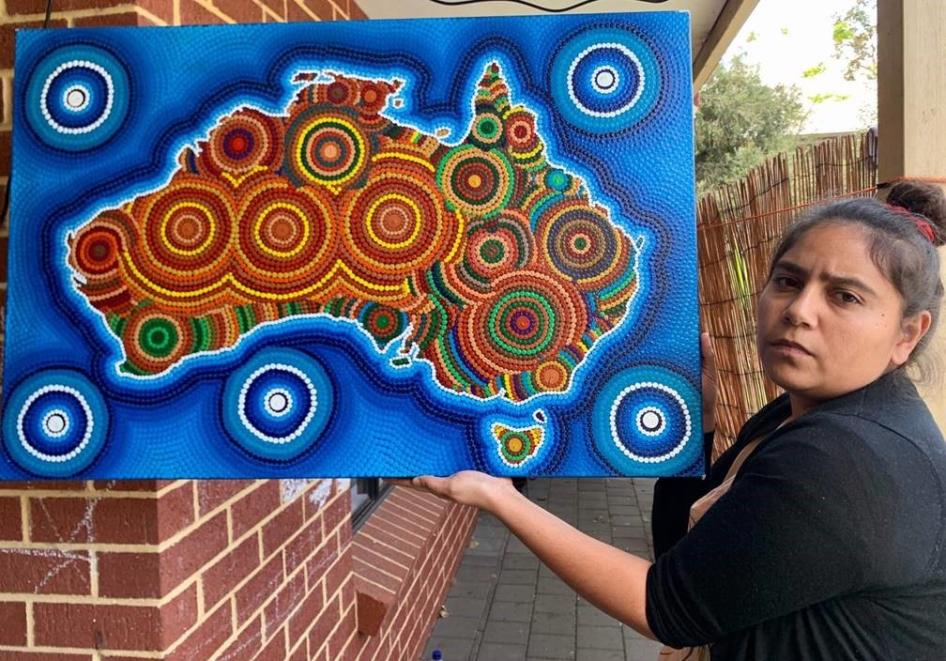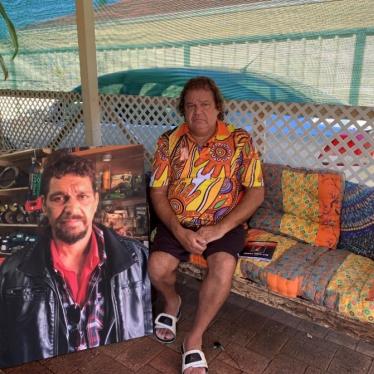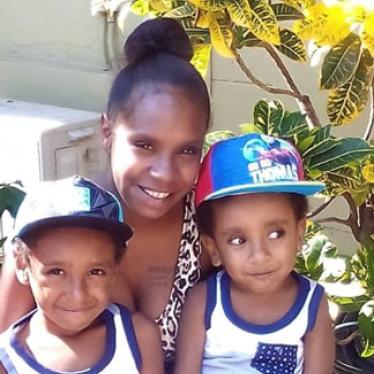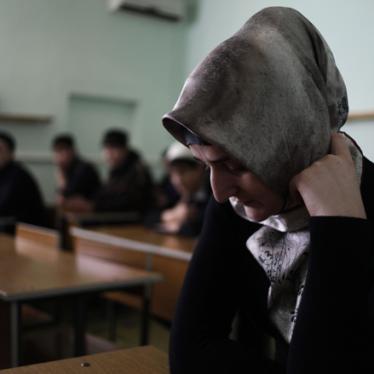Aboriginal and Torres Strait Islander peoples should be aware that this piece contains the name and image of a deceased person. His name and image are used with the permission of the family.
When 31-year-old Jacinta Miller sat in the Intensive Care Unit at Western Australia’s Midland hospital holding her little brother’s hand, she noticed there were little spots of paint under his fingernails.
Stanley, age 19, had been rushed to the hospital from Acacia prison on July 11 after fellow inmates found him hanging in an unlocked storeroom near his cell.
The young Noongar man had depression and anxiety. He was a promising artist; and painting had always helped him see the light from the darkness. But in prison, it had been hard for Stanley to see any light.
In February, a court had sentenced Stanley to two years in prison for burglary-related offences. He was not accused of any violent crimes, and with parole Stanley could have been released in six months. It was the first time he had been in an adult prison and in phone calls to his older sister, it was clear he was not coping well.
“I could hear the distress in his voice. He would tell me that he was sorry for being in there,” Miller recalled. “Telling me it’s not a place for kids, so he didn’t want his nieces or nephews going in there. He said to me I’m never coming back here again. I said to him, go and do some painting and he just said to me, yeah, I will. And it broke my heart because when I had to say goodbye to my brother, he still had paint under his nails.”
Paint was not all Miller found on her brother’s body.
There were also cuts.
“I’m seeing my brother with physical signs all over his chest and all over his arms. That he was cutting himself. These were weeks old!” Miller said tearfully. “Never in a million years did I ever think that the jail would neglect him so badly.”
Stanley died two days after being admitted to the hospital, one of three suspected suicides in Western Australia’s prisons in just the past four months. A coroner’s inquest is underway.
New research from Human Rights Watch shows that about 60 percent of people who died in prisons—both state and privately run— in Western Australia between 2010 and 2020 had a disability, which includes people like Stanley, struggling with their mental health.
Of those with a disability who died, 58 percent died as a result of lack of support, suicide, or violence – and half of these deaths were of Aboriginal and Torres Strait Islander prisoners.
Stanley’s case and those of dozens of others we examined are illustrative of the severely inadequate mental health support in Western Australian prisons. Limited resources and high demand sometimes lead prisons to reduce mental health services to distributing medication and providing acute crisis counselling, instead of psychosocial support. Prisoners are placed in conditions that often amount to solitary confinement causing severe psychological distress that pushes many over the edge.
These dire conditions should not come as a surprise to the McGowan government.
In fact, nearly two years before young Stanley took his life, the Western Australian Office of the Inspector of Custodial Services, the independent agency that inspects prisons and reports directly to Western Australia’s parliament, warned that “the State is not meeting the mental health needs of prisoners.”
“The daily management of people with serious mental health needs is left to custodial staff who have limited training, few management options and poor access to information,” said the Inspector’s report, which was tabled in parliament in November 2018.
In 2019, the same office criticized the privately run Acacia prison, noting that the demand for mental health services ‘cannot be met.’ It said that the small size of the mental health team and short-staffing threatened the quality of mental health care, given the large number of prisoners with high mental health needs.
In response, Serco, the contractor that runs Acacia prison, said that it undertook a range of initiatives to increase access to mental health and related programs. But it was only after Stanley’s death that the company signed a Memorandum of Understanding with a local Aboriginal Corporation that will see two Indigenous mental health support officers placed at the prison, supplementing existing Indigenous support.
In August, the McGowan government created a Suicide Prevention Taskforce to examine the recent high rates of deaths in custody in Western Australian prisons.
But we know already that what the government urgently needs to do is properly screen prisoners for all types of disabilities, including mental health conditions, when they enter prison, improve the standard of mental health services in all prisons, including those that are privately run, and end the use of solitary confinement for prisoners with disabilities, particularly Aboriginal and Torres Strait Islander peoples.
This means ensuring that mental health services in prison are culturally appropriate, that there are sufficient numbers of qualified mental health professionals, and that the services are adequately funded. The state government has been put on notice time and time again. The advice is all there. They now need to take urgent action, that will in turn save lives.








